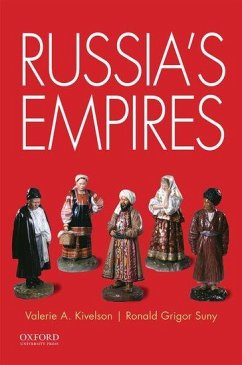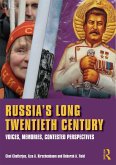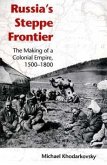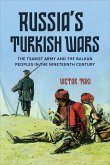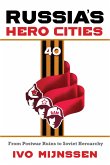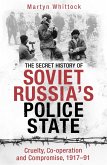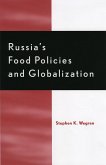Valerie A. Kivelson (Thomas N. Tentler Collegiate Professor and Art, Ronald Suny (William H. Sewell Jr. Distinguished University Profe
Russia's Empires
Andere Kunden interessierten sich auch für
![Russia's Long Twentieth Century Russia's Long Twentieth Century]() Choi ChatterjeeRussia's Long Twentieth Century42,99 €
Choi ChatterjeeRussia's Long Twentieth Century42,99 €![Russia's Steppe Frontier Russia's Steppe Frontier]() Michael KhodarkovskyRussia's Steppe Frontier24,99 €
Michael KhodarkovskyRussia's Steppe Frontier24,99 €![Russia's Turkish Wars Russia's Turkish Wars]() Victor TakiRussia's Turkish Wars78,99 €
Victor TakiRussia's Turkish Wars78,99 €![Russia's Hero Cities Russia's Hero Cities]() Ivo MijnssenRussia's Hero Cities41,99 €
Ivo MijnssenRussia's Hero Cities41,99 €![The Secret History of Soviet Russia's Police State The Secret History of Soviet Russia's Police State]() Martyn WhittockThe Secret History of Soviet Russia's Police State20,99 €
Martyn WhittockThe Secret History of Soviet Russia's Police State20,99 €![Central Asia - Russia's Near Abroad or Crossroads of Asia? Central Asia - Russia's Near Abroad or Crossroads of Asia?]() Richard Pomfret (Johns Hopkins University and The University of AdeCentral Asia - Russia's Near Abroad or Crossroads of Asia?22,99 €
Richard Pomfret (Johns Hopkins University and The University of AdeCentral Asia - Russia's Near Abroad or Crossroads of Asia?22,99 €![Russia's Food Policy and Globalization Russia's Food Policy and Globalization]() Stephen K. WegrenRussia's Food Policy and Globalization124,99 €
Stephen K. WegrenRussia's Food Policy and Globalization124,99 €-
-
-
Produktdetails
- Verlag: Oxford University Press Inc
- Seitenzahl: 448
- Erscheinungstermin: 5. Januar 2017
- Englisch
- Abmessung: 233mm x 154mm x 32mm
- Gewicht: 662g
- ISBN-13: 9780199924394
- ISBN-10: 0199924392
- Artikelnr.: 47446148
Hinweis: Dieser Artikel kann nur an eine deutsche Lieferadresse ausgeliefert werden.
- Herstellerkennzeichnung
- Libri GmbH
- Europaallee 1
- 36244 Bad Hersfeld
- gpsr@libri.de
Valerie Kivelson is Valerie Kivelson (PhD Stanford University) teaches at the University of Michigan, where she is Thomas N. Tentler Collegiate Professor and Arthur F. Thurnau Professor of History. Her publications include Desperate Magic: The Moral Economy of Witchcraft in Seventeenth-Century Russia (2013); and Cartographies of Tsardom: The Land and Its Meanings in Seventeenth-Century Russia (2006). She is the editor of Witchcraft Casebook: Magic in Russia, Poland, and Ukraine, 15th-21st Centuries [Russian History/Histoire russe vol. 40, nos. 3-4 (2013)], and co-editor, with Joan Neuberger, of Picturing Russia: Explorations in Visual Culture (2008). Ron Suny is the William H. Sewell Jr. Distinguished University Professor of History at the University of Michigan, Emeritus Professor of Political Science and History at the University of Chicago, and Senior Researcher at the Higher School of Economics in St. Petersburg, Russia. The author and editor of eighteen books, Suny pioneered the field of Soviet nationality studies, introducing the constructivist approach to the making of nations into Russian and Soviet studies. He wrote extensively on the South Caucasus (Armenia, Azerbaijan, and Georgia), the Russian Revolution, nationalism and empire. Among his principal works are: The Baku Commune, 1917-1918: Class and Nationality in the Russian Revolution; The Making of the Georgian Nation; Looking Toward Ararat: Armenia in Modern History; The Revenge of the Past: Nationalism, Revolution, and the Collapse of the Soviet Union; and The Soviet Experiment: Russia, the USSR, and the Successor States (New York: Oxford University Press, 1998; 2011).
* List of Maps
* Preface
* About the Authors
* Introduction
* Thinking About Empire
* Empires
* Russia's Imperial Formations
* Chapter One
* Before Empire: Early Rus' Visions of Diversity of Lands and Peoples
* Before the State: The Peoples of Rus
* New Models for Understanding Kiev Rus': Stateless Head or Galactic
Polity
* Appanage Rus' and Further Fragmentation
* Mongol Khans and the Aura of Empire
* Chapter Two
* Imperial Beginnings: Muscovy
* Building a State; Claiming an Empire
* Ivan the Terrible: Imperial Principles in Practice
* Muscovite Autocracy: Power and Obligation
* Who Were the Muscovites? What was Rus'?
* The People Speak: The Time of Troubles
* Imperial Conquest and Control
* Chapter Three
* Disrupting the Easy Road from Empire to Nation State: A Theoretical
Interlude
* Nation, Nationalism, and the Discourse of the Nation
* Chapter Four
* Responsive Rule and Its Limits: Force and Sentiment in the Eighteenth
Century
* Succession, Consultation, and the Politics of Affirmation
* The Petrine Revolution and the Imperial State
* Peter's Successors: A Century of Women (and Children) on Top
* Chapter Five
* Russians' Identities in the Eighteenth Century: A Multitude of
Possibilities
* What does Russian mean? Thinking about Nations in the Eighteenth
Century
* A Multiplicity of Nations: The Peoples and Divisions of Empire
* Imperial Expansion in the Eighteenth Century
* Chapter Six
* Imperial Russia in the Moment of the Nation, 1801-1855
* A Kind of Constitution
* Clash of Empires
* Imperial Conservatism
* The Decembrists
* Official Nationality
* The Intelligentsia
* Expansion, Conquest, and Rebellion
* Imagining the Russian "Nation": Between West and East
* Chapter Seven
* War, Reforms, Revolt, and Reaction
* A Foolish War
* The Great Reforms: Nations, Subjects, and Citizens
* Participatory Politics and Categories of Difference
* Who Are We? More Questions of National Identity
* Russification, Diversity, and Empire
* "Pacifying" the Peripheries
* Conquering Central Asia
* Counter-Reforms and Political Polarization
* Empire and the Revolutionary Movement
* Chapter Eight
* Imperial Anxieties: 1905-1914
* The Fate of Empires in the Twentieth Century
* The Modernizing Empire and its Discontents
* Imperial Overreach: Tsarist Modernization and Expansion
* The First Revolution, 1905
* When Nationalism Goes Public: Reimagining Empire
* Chapter Nine
* Clash and Collapse of Empires: 1914-1921
* The Great War
* Nationality and Class Across the Revolutionary Divide
* Soviet Power
* Soviet Nationality Policies
* Chapter Ten
* Making Nations, Soviet Style: 1921-1953
* The Stalin Years, 1928-1953
* Beating Peasants into Submission
* Empire-State and State of Nations
* Building National Bolshevism
* From Hot War to Cold War: External Empire as Defensive Expansion
* Cold War at Home: The Internal Empire
* Soviet Discursive Power
* Chapter Eleven
* Imperial Impasses: Reform, Reaction, Revolution
* Policy and Experience: Friendship of the Peoples
* A Strange Empire
* The Soviet Union in the World
* Stagnation
* Gorbachev and the Test of Perestroika
* Chapter Twelve
* The End of Empire, 1991-2016... Or Not?
* Vladimir Putin and the Rebuilding of the State
* Democratic Recession in the Post-Soviet States
* Post-Superpower Russia and NATO Expansion
* Red Lines in the Near Abroad: Georgia and Ukraine
* Conclusion
* Preface
* About the Authors
* Introduction
* Thinking About Empire
* Empires
* Russia's Imperial Formations
* Chapter One
* Before Empire: Early Rus' Visions of Diversity of Lands and Peoples
* Before the State: The Peoples of Rus
* New Models for Understanding Kiev Rus': Stateless Head or Galactic
Polity
* Appanage Rus' and Further Fragmentation
* Mongol Khans and the Aura of Empire
* Chapter Two
* Imperial Beginnings: Muscovy
* Building a State; Claiming an Empire
* Ivan the Terrible: Imperial Principles in Practice
* Muscovite Autocracy: Power and Obligation
* Who Were the Muscovites? What was Rus'?
* The People Speak: The Time of Troubles
* Imperial Conquest and Control
* Chapter Three
* Disrupting the Easy Road from Empire to Nation State: A Theoretical
Interlude
* Nation, Nationalism, and the Discourse of the Nation
* Chapter Four
* Responsive Rule and Its Limits: Force and Sentiment in the Eighteenth
Century
* Succession, Consultation, and the Politics of Affirmation
* The Petrine Revolution and the Imperial State
* Peter's Successors: A Century of Women (and Children) on Top
* Chapter Five
* Russians' Identities in the Eighteenth Century: A Multitude of
Possibilities
* What does Russian mean? Thinking about Nations in the Eighteenth
Century
* A Multiplicity of Nations: The Peoples and Divisions of Empire
* Imperial Expansion in the Eighteenth Century
* Chapter Six
* Imperial Russia in the Moment of the Nation, 1801-1855
* A Kind of Constitution
* Clash of Empires
* Imperial Conservatism
* The Decembrists
* Official Nationality
* The Intelligentsia
* Expansion, Conquest, and Rebellion
* Imagining the Russian "Nation": Between West and East
* Chapter Seven
* War, Reforms, Revolt, and Reaction
* A Foolish War
* The Great Reforms: Nations, Subjects, and Citizens
* Participatory Politics and Categories of Difference
* Who Are We? More Questions of National Identity
* Russification, Diversity, and Empire
* "Pacifying" the Peripheries
* Conquering Central Asia
* Counter-Reforms and Political Polarization
* Empire and the Revolutionary Movement
* Chapter Eight
* Imperial Anxieties: 1905-1914
* The Fate of Empires in the Twentieth Century
* The Modernizing Empire and its Discontents
* Imperial Overreach: Tsarist Modernization and Expansion
* The First Revolution, 1905
* When Nationalism Goes Public: Reimagining Empire
* Chapter Nine
* Clash and Collapse of Empires: 1914-1921
* The Great War
* Nationality and Class Across the Revolutionary Divide
* Soviet Power
* Soviet Nationality Policies
* Chapter Ten
* Making Nations, Soviet Style: 1921-1953
* The Stalin Years, 1928-1953
* Beating Peasants into Submission
* Empire-State and State of Nations
* Building National Bolshevism
* From Hot War to Cold War: External Empire as Defensive Expansion
* Cold War at Home: The Internal Empire
* Soviet Discursive Power
* Chapter Eleven
* Imperial Impasses: Reform, Reaction, Revolution
* Policy and Experience: Friendship of the Peoples
* A Strange Empire
* The Soviet Union in the World
* Stagnation
* Gorbachev and the Test of Perestroika
* Chapter Twelve
* The End of Empire, 1991-2016... Or Not?
* Vladimir Putin and the Rebuilding of the State
* Democratic Recession in the Post-Soviet States
* Post-Superpower Russia and NATO Expansion
* Red Lines in the Near Abroad: Georgia and Ukraine
* Conclusion
* List of Maps
* Preface
* About the Authors
* Introduction
* Thinking About Empire
* Empires
* Russia's Imperial Formations
* Chapter One
* Before Empire: Early Rus' Visions of Diversity of Lands and Peoples
* Before the State: The Peoples of Rus
* New Models for Understanding Kiev Rus': Stateless Head or Galactic
Polity
* Appanage Rus' and Further Fragmentation
* Mongol Khans and the Aura of Empire
* Chapter Two
* Imperial Beginnings: Muscovy
* Building a State; Claiming an Empire
* Ivan the Terrible: Imperial Principles in Practice
* Muscovite Autocracy: Power and Obligation
* Who Were the Muscovites? What was Rus'?
* The People Speak: The Time of Troubles
* Imperial Conquest and Control
* Chapter Three
* Disrupting the Easy Road from Empire to Nation State: A Theoretical
Interlude
* Nation, Nationalism, and the Discourse of the Nation
* Chapter Four
* Responsive Rule and Its Limits: Force and Sentiment in the Eighteenth
Century
* Succession, Consultation, and the Politics of Affirmation
* The Petrine Revolution and the Imperial State
* Peter's Successors: A Century of Women (and Children) on Top
* Chapter Five
* Russians' Identities in the Eighteenth Century: A Multitude of
Possibilities
* What does Russian mean? Thinking about Nations in the Eighteenth
Century
* A Multiplicity of Nations: The Peoples and Divisions of Empire
* Imperial Expansion in the Eighteenth Century
* Chapter Six
* Imperial Russia in the Moment of the Nation, 1801-1855
* A Kind of Constitution
* Clash of Empires
* Imperial Conservatism
* The Decembrists
* Official Nationality
* The Intelligentsia
* Expansion, Conquest, and Rebellion
* Imagining the Russian "Nation": Between West and East
* Chapter Seven
* War, Reforms, Revolt, and Reaction
* A Foolish War
* The Great Reforms: Nations, Subjects, and Citizens
* Participatory Politics and Categories of Difference
* Who Are We? More Questions of National Identity
* Russification, Diversity, and Empire
* "Pacifying" the Peripheries
* Conquering Central Asia
* Counter-Reforms and Political Polarization
* Empire and the Revolutionary Movement
* Chapter Eight
* Imperial Anxieties: 1905-1914
* The Fate of Empires in the Twentieth Century
* The Modernizing Empire and its Discontents
* Imperial Overreach: Tsarist Modernization and Expansion
* The First Revolution, 1905
* When Nationalism Goes Public: Reimagining Empire
* Chapter Nine
* Clash and Collapse of Empires: 1914-1921
* The Great War
* Nationality and Class Across the Revolutionary Divide
* Soviet Power
* Soviet Nationality Policies
* Chapter Ten
* Making Nations, Soviet Style: 1921-1953
* The Stalin Years, 1928-1953
* Beating Peasants into Submission
* Empire-State and State of Nations
* Building National Bolshevism
* From Hot War to Cold War: External Empire as Defensive Expansion
* Cold War at Home: The Internal Empire
* Soviet Discursive Power
* Chapter Eleven
* Imperial Impasses: Reform, Reaction, Revolution
* Policy and Experience: Friendship of the Peoples
* A Strange Empire
* The Soviet Union in the World
* Stagnation
* Gorbachev and the Test of Perestroika
* Chapter Twelve
* The End of Empire, 1991-2016... Or Not?
* Vladimir Putin and the Rebuilding of the State
* Democratic Recession in the Post-Soviet States
* Post-Superpower Russia and NATO Expansion
* Red Lines in the Near Abroad: Georgia and Ukraine
* Conclusion
* Preface
* About the Authors
* Introduction
* Thinking About Empire
* Empires
* Russia's Imperial Formations
* Chapter One
* Before Empire: Early Rus' Visions of Diversity of Lands and Peoples
* Before the State: The Peoples of Rus
* New Models for Understanding Kiev Rus': Stateless Head or Galactic
Polity
* Appanage Rus' and Further Fragmentation
* Mongol Khans and the Aura of Empire
* Chapter Two
* Imperial Beginnings: Muscovy
* Building a State; Claiming an Empire
* Ivan the Terrible: Imperial Principles in Practice
* Muscovite Autocracy: Power and Obligation
* Who Were the Muscovites? What was Rus'?
* The People Speak: The Time of Troubles
* Imperial Conquest and Control
* Chapter Three
* Disrupting the Easy Road from Empire to Nation State: A Theoretical
Interlude
* Nation, Nationalism, and the Discourse of the Nation
* Chapter Four
* Responsive Rule and Its Limits: Force and Sentiment in the Eighteenth
Century
* Succession, Consultation, and the Politics of Affirmation
* The Petrine Revolution and the Imperial State
* Peter's Successors: A Century of Women (and Children) on Top
* Chapter Five
* Russians' Identities in the Eighteenth Century: A Multitude of
Possibilities
* What does Russian mean? Thinking about Nations in the Eighteenth
Century
* A Multiplicity of Nations: The Peoples and Divisions of Empire
* Imperial Expansion in the Eighteenth Century
* Chapter Six
* Imperial Russia in the Moment of the Nation, 1801-1855
* A Kind of Constitution
* Clash of Empires
* Imperial Conservatism
* The Decembrists
* Official Nationality
* The Intelligentsia
* Expansion, Conquest, and Rebellion
* Imagining the Russian "Nation": Between West and East
* Chapter Seven
* War, Reforms, Revolt, and Reaction
* A Foolish War
* The Great Reforms: Nations, Subjects, and Citizens
* Participatory Politics and Categories of Difference
* Who Are We? More Questions of National Identity
* Russification, Diversity, and Empire
* "Pacifying" the Peripheries
* Conquering Central Asia
* Counter-Reforms and Political Polarization
* Empire and the Revolutionary Movement
* Chapter Eight
* Imperial Anxieties: 1905-1914
* The Fate of Empires in the Twentieth Century
* The Modernizing Empire and its Discontents
* Imperial Overreach: Tsarist Modernization and Expansion
* The First Revolution, 1905
* When Nationalism Goes Public: Reimagining Empire
* Chapter Nine
* Clash and Collapse of Empires: 1914-1921
* The Great War
* Nationality and Class Across the Revolutionary Divide
* Soviet Power
* Soviet Nationality Policies
* Chapter Ten
* Making Nations, Soviet Style: 1921-1953
* The Stalin Years, 1928-1953
* Beating Peasants into Submission
* Empire-State and State of Nations
* Building National Bolshevism
* From Hot War to Cold War: External Empire as Defensive Expansion
* Cold War at Home: The Internal Empire
* Soviet Discursive Power
* Chapter Eleven
* Imperial Impasses: Reform, Reaction, Revolution
* Policy and Experience: Friendship of the Peoples
* A Strange Empire
* The Soviet Union in the World
* Stagnation
* Gorbachev and the Test of Perestroika
* Chapter Twelve
* The End of Empire, 1991-2016... Or Not?
* Vladimir Putin and the Rebuilding of the State
* Democratic Recession in the Post-Soviet States
* Post-Superpower Russia and NATO Expansion
* Red Lines in the Near Abroad: Georgia and Ukraine
* Conclusion

